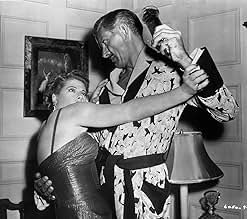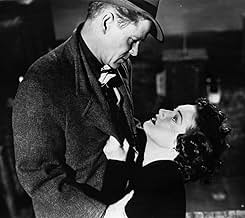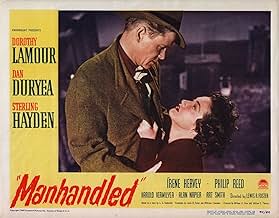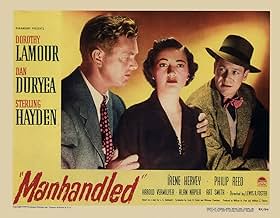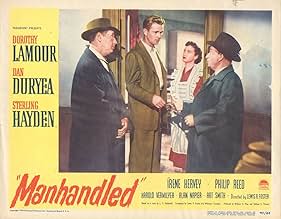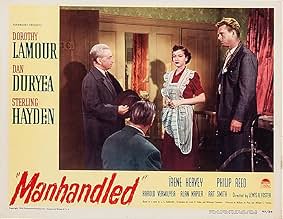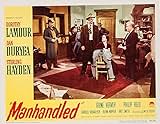The secretary to a psychiatrist finds herself caught up in the murder of a patient's wife and realizes that her life is also in danger.The secretary to a psychiatrist finds herself caught up in the murder of a patient's wife and realizes that her life is also in danger.The secretary to a psychiatrist finds herself caught up in the murder of a patient's wife and realizes that her life is also in danger.
- Director
- Writers
- Stars
Stanley Blystone
- Cop
- (uncredited)
Paul E. Burns
- Pawn Shop Owner
- (uncredited)
James Edwards
- Henry, Bennet's Butler
- (uncredited)
Morgan Farley
- Doc, Police Lab Man
- (uncredited)
John George
- Newspaper Vendor
- (uncredited)
George Humbert
- Italian Restaurant Owner
- (uncredited)
Ray Hyke
- Detective Phil Wilson
- (uncredited)
Donald Kerr
- Reporter
- (uncredited)
- Director
- Writers
- All cast & crew
- Production, box office & more at IMDbPro
Featured reviews
A woman gets murdered and her jewels are missing... with a heaping handful of likely suspects, the cops and the insurance investigator have their work cut out for them. The crackerjack script is skillful at doling out information in a series of intriguing twists and turns, with a lot of clever details. It's also laced with some humor, some of it doesn't work but a lot of it does. Dan Duryea does what he does best as the sleazy parasite of a private dick, Sterling Hayden plays it a little shabbier than usual as the insurance man, and Art Smith has an enjoyable turn as the homicide detective. Dorothy Lamour falls a little short but it's not a very meaty role. There's a lot of nice little bits of business and a cynical, seedy edge that occasionally cuts through the more light-hearted nature of the film. A fun little movie.
... makes this film. Paramount made another film with the exact same name 25 years before, but it was a Gloria Swanson film very much of its time, and this is a film very much of its time - the film noir cycle. And the title is a bit bewildering since "manhandling" really has nothing to do with the plot.
The film opens with psychiatrist Dr. Redman listening to his patient, Alton Bennett (Alan Napier) , talking about a troubling recurring dream he has in which he murders his wealthy and wayward wife, Ruth (Irene Harvey). The doctor advises Bennett to sleep in the guest bedroom for a few nights if he is afraid of what he might do. He then tells his secretary, Merl (Dorothy Lamour), to return that night because he wants to tell Mrs. Bennett all about what her husband just said. Patient-doctor confidentiality isn't what it used to be apparently.
The most catching of Mrs. Bennett's possessions are a bunch of jewels that she owns that are worth and insured for one hundred thousand dollars. After the doctor tells Mrs. Bennett about her husband's dream, she blows it off basically telling the doctor that her husband is harmless. But the next day she is found murdered in her apartment and the jewels are missing.
There are plenty of suspects besides the husband. For one, the secretary Merl has some kind of secret past, and she has only been working for the doctor for four weeks. Her downstairs neighbor, a PI and ex-cop (Duryea) seems up to no good, and Ruth Bennett told her latest boyfriend about the husband's threat and he seems surprised and fascinated when she also tells him that the jewels are authentic - he thought they were fake. Who knows what other people Ruth might have told about the jewels or who these people that we know about might have told.
There are plenty of twists in this one, and who actually did it is a surprise, but it is a bit of a mystery that Duryea is third billed since he is the person you notice, whose character jumps off the screen at you. Lamour and even Sterling Hayden, whose big break will come the following year in Asphalt Jungle, and are both billed above Duryea, seem a bit two dimensional in this. It is really a plot driven noir.
Paramount didn't do very many noirs, but the ones they did do were done extremely well. Maybe this one isn't as well known as "Sorry Wrong Number" because there are no really big names in it. I'd recommend it.
The film opens with psychiatrist Dr. Redman listening to his patient, Alton Bennett (Alan Napier) , talking about a troubling recurring dream he has in which he murders his wealthy and wayward wife, Ruth (Irene Harvey). The doctor advises Bennett to sleep in the guest bedroom for a few nights if he is afraid of what he might do. He then tells his secretary, Merl (Dorothy Lamour), to return that night because he wants to tell Mrs. Bennett all about what her husband just said. Patient-doctor confidentiality isn't what it used to be apparently.
The most catching of Mrs. Bennett's possessions are a bunch of jewels that she owns that are worth and insured for one hundred thousand dollars. After the doctor tells Mrs. Bennett about her husband's dream, she blows it off basically telling the doctor that her husband is harmless. But the next day she is found murdered in her apartment and the jewels are missing.
There are plenty of suspects besides the husband. For one, the secretary Merl has some kind of secret past, and she has only been working for the doctor for four weeks. Her downstairs neighbor, a PI and ex-cop (Duryea) seems up to no good, and Ruth Bennett told her latest boyfriend about the husband's threat and he seems surprised and fascinated when she also tells him that the jewels are authentic - he thought they were fake. Who knows what other people Ruth might have told about the jewels or who these people that we know about might have told.
There are plenty of twists in this one, and who actually did it is a surprise, but it is a bit of a mystery that Duryea is third billed since he is the person you notice, whose character jumps off the screen at you. Lamour and even Sterling Hayden, whose big break will come the following year in Asphalt Jungle, and are both billed above Duryea, seem a bit two dimensional in this. It is really a plot driven noir.
Paramount didn't do very many noirs, but the ones they did do were done extremely well. Maybe this one isn't as well known as "Sorry Wrong Number" because there are no really big names in it. I'd recommend it.
"Manhandled" is a decent 1949 film with a terrific cast that could have been really excellent. Unfortunately, it suffers from a lack of focus from director Lewis Foster.
Dorothy Lamour plays the secretary to a psychiatrist (Harold Vermilyea) who is treating an author (Alan Napier). The man has a recurring dream that he kills his wife (Irene Hervey) with a large perfume bottle. The doctor thinks he needs money and might be after his wife's jewels, worth somewhere in the range of $100,000.
Lamour, whose character's name is Merl Kramer, tells a detective in her apartment building (Dan Duryea) about the strange case. Any of us who have ever seen Dan Duryea in a film know that this is a mistake on her part.
As could have been predicted, the wife of the author winds up dead, the jewels stolen, and one of the pieces winds up in Merl's couch. She pawns it and finds herself in deep trouble.
As you might be able to tell from the above description, the director isn't the only problem here. The script doesn't hold up to the most casual of scrutiny.
Granted Merl doesn't tell the Duryea character the name of her boss' client, but she certainly would know what goes on in the office is confidential. The big perfume bottle as the murder weapon is pretty lame.
The worst aspect for me is the diagnosis of the psychiatrist. A man and his wife are living under the same roof, but they're estranged. She's seeing somebody else, in fact, and the psychiatrist comes to the conclusion that the author wants his wife's jewels. That's some stretch.
It's always sad to see what happened to some of the glamorous female film stars - Lamour here is all of 34 and relegated to smaller films. Her character has a mysterious past which we never really learn about, another script hole.
Sterling Hayden plays an insurance investigator and does a good job. Art Smith is the police detective and very funny.
Kind of a mish-mash, and a convoluted plot that could have emerged as a neat twist in other hands, but some good scenes nonetheless.
Dorothy Lamour plays the secretary to a psychiatrist (Harold Vermilyea) who is treating an author (Alan Napier). The man has a recurring dream that he kills his wife (Irene Hervey) with a large perfume bottle. The doctor thinks he needs money and might be after his wife's jewels, worth somewhere in the range of $100,000.
Lamour, whose character's name is Merl Kramer, tells a detective in her apartment building (Dan Duryea) about the strange case. Any of us who have ever seen Dan Duryea in a film know that this is a mistake on her part.
As could have been predicted, the wife of the author winds up dead, the jewels stolen, and one of the pieces winds up in Merl's couch. She pawns it and finds herself in deep trouble.
As you might be able to tell from the above description, the director isn't the only problem here. The script doesn't hold up to the most casual of scrutiny.
Granted Merl doesn't tell the Duryea character the name of her boss' client, but she certainly would know what goes on in the office is confidential. The big perfume bottle as the murder weapon is pretty lame.
The worst aspect for me is the diagnosis of the psychiatrist. A man and his wife are living under the same roof, but they're estranged. She's seeing somebody else, in fact, and the psychiatrist comes to the conclusion that the author wants his wife's jewels. That's some stretch.
It's always sad to see what happened to some of the glamorous female film stars - Lamour here is all of 34 and relegated to smaller films. Her character has a mysterious past which we never really learn about, another script hole.
Sterling Hayden plays an insurance investigator and does a good job. Art Smith is the police detective and very funny.
Kind of a mish-mash, and a convoluted plot that could have emerged as a neat twist in other hands, but some good scenes nonetheless.
Manhandled is directed by Lewis R. Foster and adapted to screenplay by Foster and Whitman Chambers from the novel "The Man Who Stole A Dream" written by L. S. Goldsmith. It stars Dorothy Lamour, Dan Duryea, Sterling Hayden, Irene Hervey and Art Smith. Music is by Darrell Calker and cinematography by Ernest Laszlo.
I'm going to kill you, Ruth. I have to.
Manhandled is one of those late 40s crime mysteries that feature film noir legends and film noir narrative tints, thus why it finds itself under the film noir banner. This is more a curse than a blessing. For it's not a particularly great film, where the presence of Hayden and Duryea - and Laszlo on photography - just about keeps things bubbling away to make it watchable till the end. It has been said that the narrative is too tricksy for its own good, yet that isn't apparent since the story is very easy to follow. The twists come and go at regular intervals, but always with narrative clarity.
The main thrust of the plot finds Lamour being set up as the killer of Mrs. Alton Bennet (Hervey), with Bennet's jewels the reason for the crime. But there are a few other candidates in the frame, all of which are written to be believable suspects. The cops investigating are waspish of tongue, with Smith as dry as the Sahara, and Hayden is playing an insurance investigator who is along for the ride doing exactly the same job that the coppers are doing!
Duryea is the star attraction, playing a homme fatale type who chews gum a lot, calls his girlfriend Kitten and clearly is as untrustworthy as it gets (classic Duryea portrayal really!). Hayden doesn't show up until half an hour in, but he's a welcome arrival even if he isn't given much to get his teeth into. While Lamour pouts and ponders whilst gaining sympathy, which ultimately makes us wish she had of done more film noir type films.
There's some nice metaphorical touches, such as Duryea encamped in his apartment watching a vermin species consistently running on its wheel, and Laszlo's photography goes up a notch in the latter half of film - Lamour's apartment becomes foreboding and all the hall staircase sequences take on a greater oppressive meaning. A dream sequence is chilling, and there's one particular violent scene that is unforgettable. Unfortunately some of the comedy, whilst funny at times (drugs scenes are chucklesome), takes the pic out of its dramatic comfort zone.
Hayden and Duryea fans are safe in the knowledge that this is one to see, but it still winds up as a wasted opportunity to be something far more tougher and poignant. 6/10
I'm going to kill you, Ruth. I have to.
Manhandled is one of those late 40s crime mysteries that feature film noir legends and film noir narrative tints, thus why it finds itself under the film noir banner. This is more a curse than a blessing. For it's not a particularly great film, where the presence of Hayden and Duryea - and Laszlo on photography - just about keeps things bubbling away to make it watchable till the end. It has been said that the narrative is too tricksy for its own good, yet that isn't apparent since the story is very easy to follow. The twists come and go at regular intervals, but always with narrative clarity.
The main thrust of the plot finds Lamour being set up as the killer of Mrs. Alton Bennet (Hervey), with Bennet's jewels the reason for the crime. But there are a few other candidates in the frame, all of which are written to be believable suspects. The cops investigating are waspish of tongue, with Smith as dry as the Sahara, and Hayden is playing an insurance investigator who is along for the ride doing exactly the same job that the coppers are doing!
Duryea is the star attraction, playing a homme fatale type who chews gum a lot, calls his girlfriend Kitten and clearly is as untrustworthy as it gets (classic Duryea portrayal really!). Hayden doesn't show up until half an hour in, but he's a welcome arrival even if he isn't given much to get his teeth into. While Lamour pouts and ponders whilst gaining sympathy, which ultimately makes us wish she had of done more film noir type films.
There's some nice metaphorical touches, such as Duryea encamped in his apartment watching a vermin species consistently running on its wheel, and Laszlo's photography goes up a notch in the latter half of film - Lamour's apartment becomes foreboding and all the hall staircase sequences take on a greater oppressive meaning. A dream sequence is chilling, and there's one particular violent scene that is unforgettable. Unfortunately some of the comedy, whilst funny at times (drugs scenes are chucklesome), takes the pic out of its dramatic comfort zone.
Hayden and Duryea fans are safe in the knowledge that this is one to see, but it still winds up as a wasted opportunity to be something far more tougher and poignant. 6/10
A stuffy novelist (Alan Napier) suffers recurring nightmares that he bludgeons his rich jewel-horse of a wife (Irene Hervey) to death with a `quart' bottle of cologne. That's bad enough, but what's worse is that he confides his dreams to a shrink (Harold Vermilyea). Didn't he know that it was the 1940s, when psychiatry was little more than a hotbed of scheming quacks? So when his wife inevitably winds up dead (and her diamonds stolen), he becomes the prime suspect, even though she had been out clubbing with another man (Philip Reed).
That's the uptown side of Manhandled; there's a seedier angle as well. The psychiatrist's transcriptionist (Dorothy Lamour) not only sits in on his sessions but later climbs the stairs to her Manhattan walk-up and spills the beans to her neighbor Dan Duryea, an ex-cop now doing repo jobs and divorce frame-ups. So much for codes of confidentiality. But when a signet ring she found while vacuuming her sofa and then pawned brings the police to her door, along with insurance investigator Sterling Hayden, it starts to look bad. It doesn't help that she just blew in from Los Angeles with forged letters of reference....
Manhandled unfurls an elaborate, and none too plausible, mystery plot competently enough, even with a few skillful touches (in its final quarter, it takes a sharp turn toward noir, and better late than never). Director Lewis Foster, however, failed to optimize the solid cast he was handed: Hayden's part never comes into clear focus and Lamour plays little more than a bland patsy. Duryea dominates, with his familiar two-faced persona as the cheery suck-up who likes to slap women around; Art Smith, as the comic relief of the police detective, becomes, after Duryea, the movie's most memorable character. It's not a bad movie, despite a couple of clunky flashbacks. But in better hands, it could have become one of the better noirs. As it stands, it merits that dark and honorable designation only by the skin of its teeth.
That's the uptown side of Manhandled; there's a seedier angle as well. The psychiatrist's transcriptionist (Dorothy Lamour) not only sits in on his sessions but later climbs the stairs to her Manhattan walk-up and spills the beans to her neighbor Dan Duryea, an ex-cop now doing repo jobs and divorce frame-ups. So much for codes of confidentiality. But when a signet ring she found while vacuuming her sofa and then pawned brings the police to her door, along with insurance investigator Sterling Hayden, it starts to look bad. It doesn't help that she just blew in from Los Angeles with forged letters of reference....
Manhandled unfurls an elaborate, and none too plausible, mystery plot competently enough, even with a few skillful touches (in its final quarter, it takes a sharp turn toward noir, and better late than never). Director Lewis Foster, however, failed to optimize the solid cast he was handed: Hayden's part never comes into clear focus and Lamour plays little more than a bland patsy. Duryea dominates, with his familiar two-faced persona as the cheery suck-up who likes to slap women around; Art Smith, as the comic relief of the police detective, becomes, after Duryea, the movie's most memorable character. It's not a bad movie, despite a couple of clunky flashbacks. But in better hands, it could have become one of the better noirs. As it stands, it merits that dark and honorable designation only by the skin of its teeth.
Did you know
- TriviaStar Dorothy Lamour, in her autobiography, described working with George Reeves in the role of "an extremely sinister cad," despite the fact that he is nowhere to be seen in the film and no studio or trade references confirm his participation.
- GoofsThe police would never have allowed a private detective to search a suspect's room unaccompanied because of the risk of evidence being planted, which is exactly what happened. Similarly they would not have tolerated interference by an insurance investigator.
- Quotes
Detective Lt. Bill Dawson: I've never known a congenital wise-guy yet that didn't outsmart himself.
- ConnectionsReferenced in Les enquêtes de Remington Steele: Cast in Steele (1984)
- How long is Manhandled?Powered by Alexa
Details
- Runtime
- 1h 37m(97 min)
- Color
- Aspect ratio
- 1.37 : 1
Contribute to this page
Suggest an edit or add missing content

